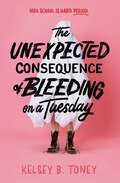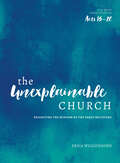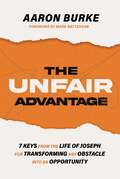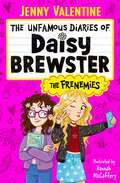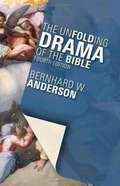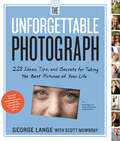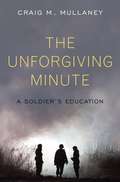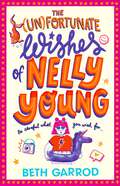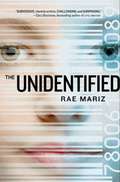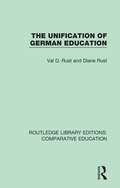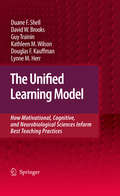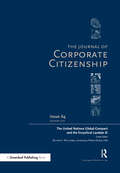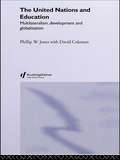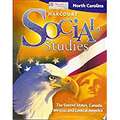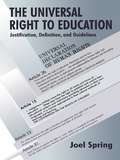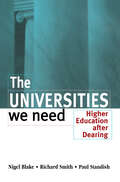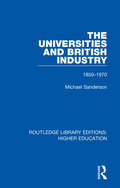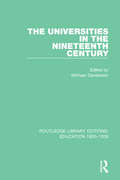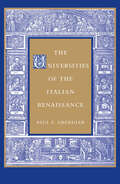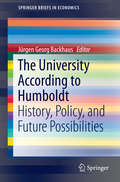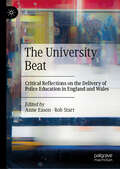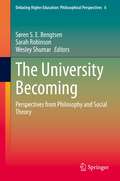- Table View
- List View
The Unexpected Consequence of Bleeding on a Tuesday
by Kelsey B. ToneyGrowing up is painful. A fresh, funny and relatable coming-of-age YA novel, perfect for fans of The Summer I Turned Pretty and XO, Kitty. Delia has the most amazing friends and family, killer grades at a fancy prep school, and, with graduation just one semester away, her dream of becoming a doctor is finally within reach. Until she is forced to face the unexpected consequence of a painful period on a Tuesday . . . Expelled and with no choice but to return to her old high school, Delia must confront her ex-best friend, the boy with the blinding-est smile and the most embarrassing moment of her life - infamously known as The Bloodbath. What could possibly go wrong?
The Unexplainable Church: Reigniting the Mission of the Early Believers (A Study of Acts 13-28)
by Erica WiggenhornFinally, a Bible study that goes deep...Frustrated with the watered-down, &“light&” Bible studies that are all too common, Erica Wiggenhorn wanted to write a study that went deep. She wanted to take readers verse-by-verse through a whole book of the Bible, offering theological and historical comments in each lesson while remaining practical and relational. The Unexplainable Church is the result, and it offers readers two great takeaways. It will teach them by example how to study the Bible deeply, and it will challenge them toward critical life-change: submitting their will to the mission of Jesus, who gives life its fullest meaning. The message of The Unexplainable Church is that the early church didn&’t grow because Peter and Paul were so amazing, but because average people were transformed by God and brought together in His work. This 10-week inductive study of Acts 13–28 will sweep readers into the great drama of the Kingdom, inspiring them to live together in the power of the Spirit and accomplish what could never be done alone. PLUS! Check out The Unexplainable Church DVD for even more great teaching from Erica Wiggenhorn. It's the perfect resource for your small group.
The Unexplainable Church: Reigniting the Mission of the Early Believers (A Study of Acts 13-28)
by Erica WiggenhornFinally, a Bible study that goes deep...Frustrated with the watered-down, &“light&” Bible studies that are all too common, Erica Wiggenhorn wanted to write a study that went deep. She wanted to take readers verse-by-verse through a whole book of the Bible, offering theological and historical comments in each lesson while remaining practical and relational. The Unexplainable Church is the result, and it offers readers two great takeaways. It will teach them by example how to study the Bible deeply, and it will challenge them toward critical life-change: submitting their will to the mission of Jesus, who gives life its fullest meaning. The message of The Unexplainable Church is that the early church didn&’t grow because Peter and Paul were so amazing, but because average people were transformed by God and brought together in His work. This 10-week inductive study of Acts 13–28 will sweep readers into the great drama of the Kingdom, inspiring them to live together in the power of the Spirit and accomplish what could never be done alone. PLUS! Check out The Unexplainable Church DVD for even more great teaching from Erica Wiggenhorn. It's the perfect resource for your small group.
The Unfair Advantage: 7 Keys from the Life of Joseph for Transforming Any Obstacle into an Opportunity
by Aaron Burke"Life's not fair!" You've heard it a million times--and probably said it yourself. But what if your greatest difficulties were steppingstones to a greater destiny? What if seasons of unbearable pain turned out to be pathways to unbelievable purpose?In The Unfair Advantage, pastor Aaron Burke takes a closer look at the seven unfair seasons Joseph endures in the book of Genesis and reveals how Joseph's struggles are not unlike the battles readers face today.Combining biblical truths with Pastor Aaron's insights from his years of walking with people through their biggest challenges, this book offers a message of hope and renewed strength for anyone who has battled seasons of feeling discouraged, rejected, undervalued, tempted, unfairly punished, deprived, or forgotten. The surprising reality revealed by the story of Joseph is that unfair moments and seasons of difficulty--if handled wisely--can actually be used by God for our advantage.Readers will be comforted and inspired as they encounter in a new way the dramatic story of Joseph's trials and ultimate triumph. Along the way, they'll learn how totransform adversity into advantage,endure even the most challenging moments through courage and hope rooted in faith,become aware of God's presence, peace, and promise in the midst of hardship. In The Unfair Advantage, readers who are walking through a season that seems unfair will be reminded of God's ultimate gift of favor. While their situation may seem hopeless now, they can trust that God is forging something beautiful out of the brokenness, putting purpose to their pain, righting every wrong, and building a destiny better than their greatest dreams.
The Unfamous Diaries of Daisy Brewster: The Frenemies (The Unfamous Diaries of Daisy Brewster)
by Jenny ValentineA new series of middle grade diaries in the vein of Lottie Brooks and Dork Diaries, with a celebrity/influencer hook Daisy Brewster is a girl with resolutions. She is determined to be her best self, get on well with her big brother and get a good part in the school play. Everyone knows Daisy is a talented actor. But not everyone knows about her super celebrity cousin, who is already breaking hearts and winning contracts on the world stage. Maxxy Bloom is a child star in Hollywood, with A-List friends, a million followers and a glamorous, lavish lifestyle. Things are about to change in all sorts of ways when she comes to stay at Daisy&’s house. Daisy fears the worst, for her routine, her personal space, her popularity, and her own dramatic ambitions. But the real Maxxy Bloom turns out to be a big surprise, and Daisy&’s very unfamous life has an unexpected effect on her guest. Told through Daisy&’s private diary, this is a story about family, ambition, and how nice it is NOT to be famous…
The Unfolding Drama of the Bible (4th edition)
by Bernhard W. AndersonIn this concise and accessible volume, one of the most revered contemporary biblical theologians introduces the first-time reader to the dramatic sweep of the Bible in eight carefully crafted study sessions, reminding even veteran readers of the Bible's central messages. Study resources and discussion questions, now carefully updated, make this book the ideal resource for introductory Bible courses and adult inquirer classes.
The Unforgettable Photograph: How to Take Great Pictures of the People and Things You Love
by George Lange Scott MowbrayRenowned photographer George Lange’s work is guided by one simple truth: An unforgettable photograph is not about what the subject looks like, but what it feels like. In this entirely new kind of photography guide, written by Mr. Lange and Scott Mowbray, magazine editor and longtime amateur photographer, the rest of us will learn how to take photographs that don’t just document life but celebrate it.No fancy equipment required. Just hundreds of simple, inspiring ideas and lessons—each one illustrated with a photograph—organized around the six essential principles of seeing like a photographer. (Here’s one: Shoot the Moment, Not the Subject.)Here’s why to shoot in natural light—always. The fun of putting babies in surprising places. How to get intimate with food. Using a dramatic sky as your backdrop. The benefit of learning to know the light in every room of your house. Shooting hands or feet instead of faces. How to move past the “I was here” postcard effect. How to catch the in-between moments. Because in the end, it’s about living the moment, shooting the moment—and being in the moment forever.
The Unforgiving Minute: A Soldier's Education
by Craig M. MullaneyA West Point grad, Rhodes Scholar, and Army Ranger recounts his unique education and struggles with the hard lessons that only war can teach. One haunting afternoon on Losano Ridge in Afghanistan, U.S. Army Captain Craig Mullaney and his infantry platoon were caught in a deadly firefight with Al Qaeda fighters, when a message came over the radio: one of his soldiers had been killed by the enemy. Mullaney's education, the four years he spent at West Point, and the harrowing test of Ranger School, readied him for a career in the Army. His subsequent experience as a Rhodes Scholar at Oxford couldn't have been further from the Army and his working-class roots, and yet the unorthodox education he received there would be surprisingly relevant as a combat leader. But despite all his preparation, the hardest questions remained. When the call came to lead his platoon into battle and earn his soldiers' salutes, would he be ready? Was his education sufficient for the unforgiving minutes he'd face? Years later, after that excruciating experience in Afghanistan, he would return to the United States to teach history to future Navy and Marine Corps officers at the Naval Academy. He had been in their position once, not long ago. How would he use his own life-changing experience to prepare them? Written with unflinching honesty, The Unforgiving Minute is an unforgettable portrait of a young soldier grappling with the weight of his hard-earned knowledge, while at last coming to terms with what it really means to be a man.
The Unfortunate Wishes of Nelly Young
by Beth GarrodFrom bestselling author Beth Garrod comes a fantastically funny wish fulfilment story. Perfect for fans of The Extremely Embarrassing Life of Lottie Brooks and The Amazing Edie Eckhart. Secondary school is ninety-eight days away, which means I&’m running out of time to break free from my totally embarrassing nickname Breaking News Nelly . . . Why did it have to be me who tripped playing netball and smashed a TV camera during the live report on our new sports hall opening?! I desperately need a relaunch, but it's hard when you have the worst luck in the world! At least I have my best friends Clara and Jas. Even though nothing ever seems to go right for us, we&’ve always been in it together. Like the time we wrote down our ultimate wishes but knew they wouldn&’t come true . . . until they did! Now more and more of our wishes are being granted, and we&’re having the best time ever! Maybe my fortunes have changed and I have the chance to ditch my old identity and become Totally Cool Nelly. Surely absolutely nothing is about to go wrong . . .?Praise for Sister Switch: 'Hilarious!' Jenny Valentine, author of A Girl Called Joy 'Blistering funny, this book is a joyous, sunny, heart-warming treat!' Simon James Green, author of Life of Riley &‘World-class and whip-smart comedy.&’ Sibéal Pounder, author of the Bad Mermaid series 'Beth Garrod is the queen of capturing those funny-awful-awkward teen moments and she creates such warm, loveable and relatable characters!' Perdita Cargill, author of Diary of an Accidental Witch
The Unidentified
by Rae MarizFifteen-year-old Katey (aka Kid) goes to school in the Game-a mall converted into a "school" run by corporate sponsors. As the students play their way through the levels, they are also creating products and being used for market research by the sponsors, who are watching them 24/7 on video cameras. Kid has a vague sense of unease but doesn't question this existence until one day she witnesses a shocking anticorporate prank. She follows the clues to uncover the identities of the people behind it and discovers an anonymous group that calls itself the Unidentified. Intrigued by their counterculture ideas and enigmatic leader, Kid is drawn into the group. But when the Unidentified's pranks and even Kid's own identity are co-opted by the sponsors, Kid decides to do something bigger-something that could change the Game forever. This funny, sharp, and thought-provoking novel heralds the arrival of a stunning new voice in teen fiction.
The Unification of German Education (Routledge Library Editions: Comparative Education #13)
by Val D. Rust Diane RustOriginally published in 1995. This study of the integration of East and West German education following the collapse of the German Democratic Republic in 1989 focuses on policy formation and implementation during this period of great social and political turbulence. It is the result of a research project undertaken shortly after the unification. The authors lived in East Germany for a full year, looking carefully at individual schools, vocational training centers, teacher colleges, and universities. The book considers questions of how education policy is successfully formulated, conditions in which that policy is implemented and the consequences of the implemented educational reform. The first chapters present the context and history of German education and the later chapters discuss the unification and the formation of the new school laws and the successes and failures. The authors' research shows that even before the unification East Germans had already opted for a system consistent with West German education law. However, the West Germans disregarded these changes and imposed their own version of reform on East Germany. The German situation at this time is of great interest to all educators, particularly students of educational policy making, as well as researchers in political science, economics, and sociology.
The Unified Learning Model
by Kathleen M. Wilson Guy Trainin David W. Brooks Duane F. Shell Douglas F. Kauffman Lynne M. HerrThis cutting-edge synthesis of ideas and concepts from the cognitive, motivation, and neurobiological sciences sets out a unique theory of learning that should be of interest to everyone from education practitioners to neuroscientists. The authors base their Unified Learning Model, or ULM, on three core principles. Firstly, that learning requires working memory allocation (attention). Second, that working memory's capacity for allocation is affected by prior knowledge. And finally, that working memory allocation is directed by motivation. These three principles guide a complete model of learning that synthesizes what is known from research in brain function, cognition, and motivation. This, then, is a book about how humans learn. Its focus is on classroom learning although the principles are, as the name of the book suggests, universal. The text's scope covers learning from pre-school to post-graduate, as well as training in business, industrial and the military. It addresses all learning described by the word "thought", as well as anything we might try to teach, or instruct in formal educational settings. The book presents a model of learning that the authors offer as scientists rather than educators. They assert that more than enough is known to sustain a "scientific" model of learning. Rather than being a mere review of the literature, this work is a synthesis. Many scholars and teachers will have heard much if not most or even all of the information used to develop the model. What they will not have come across is a model - designed to be both accessible and usable - that puts together the information in just this way.
The United Nations Global Compact and the Encyclical Laudato Si: A special theme issue of The Journal of Corporate Citizenship (Issue 64)
by Oliver F. WilliamsIn April 2016, the Center for Ethics and Religious Values in Business of the Mendoza College of Business at the University of Notre Dame with the United Nations Global Compact (UNGC) Office convened a group of scholars and business leaders to discuss the Encyclical Laudato Si (LS) and the UN Sustainable Development Goals (SDGs). The articles in this special issue are from that conference; the hope is that they will provoke your thinking and lead to new action to make the world a better place.How is it that the secular United Nations and the religious Vatican have a common vision for business? At root, this common vision for business flows from a common vision for society as a whole.For business, flowing from this common vision is a common understanding of the purpose of business. Catholic social thought has always taught that the single-minded focus on making money in business can never be acceptable. The purpose of business is to create sustainable value for stakeholders and that value is not exclusively monetary value.
The United Nations and Education: Multilateralism, Development and Globalisation
by David Coleman Phillip W. JonesThe UN is often questioned about its ongoing relevance and overall effectiveness in the 21st century, particularly in its involvement with educational policy and co-operation around the globe. This ground-breaking book examines the four key agencies within the UN system that share the vital role of addressing educational futures: UNESCO, the World Bank, UNICEF and UNDP. As the core of educational multilateralism, these agencies powerfully reflect the UN's historic grounding in peace, human rights and economic development. The history of each agency's commitment to education is explored with critical detachment, with particular attention paid to the post-Cold War period, during which each agency has needed to re-think the impact of globalisation on both its modes of operation as well as the content of its education policies. Just as education policy itself has been subject to the impact of globalisation, so to has each agency had to adapt at a time when not only education but also their own mandates have been thrown open to question. This timely book will be essential reading for all those working with and for UN agencies, foreign aid workers and the development co-operation industry. At a time when education policies, budgets and strategies appear wide open to profound changes, this book will provide a much-needed roadmap to the future.
The United States and Its Neighbors (The World Around Us)
by Walter C. Parker Barry K. Beyer Jean Craven Mary A. McFarlandThe World Around Us -1991 -United States and Its Neighbours: Grade 5
The United States, Canada, Mexico, and Central America
by Michael J. Berson Tyrone C. Howard Cinthia SalinasNIMAC-sourced textbook
The Universal Right to Education: Justification, Definition, and Guidelines (Sociocultural, Political, and Historical Studies in Education)
by Joel SpringIn this book, Joel Spring offers a powerful and closely reasoned justification and definition for the universal right to education--applicable to all cultures--as provided for in Article 26 of the United Nation's Universal Declaration of Human Rights. One sixth of the world's population, nearly 855 million people, are functionally illiterate, and 130 million children in developing countries are without access to basic education. Spring argues that in our crowded global economy, educational deprivation has dire consequences for human welfare. Such deprivation diminishes political power. Education is essential for providing citizens with the tools for resisting totalitarian and repressive governments and economic exploitation. What is to be done? The historically grounded, highly original analysis and proposals Spring sets forth in this book go a long way toward answering this urgent question. Spring first looks at the debates leading up to the Universal Declaration of Human Rights in 1948, to see how the various writers dealt with the issue of cultural differences. These discussions provide a framework for examining the problem of reconciling cultural differences with universal concepts. He next expands on the issue of education and cultural differences by proposing a justification for education that is applicable to indigenous peoples and minority cultures and languages. This justification is then applied to all people within the current global economy. Acknowledging that the right to an education is inseparable from children's rights, he uses the concept of a universal right to education to justify children's rights, and, in turn, applies his definition of children's liberty rights to the concept of education. His synthesis of cultural, language, and children's rights provides the basis for a universal justification and definition for the right to education -- which, in the concluding chapters, Spring uses to propose universal guidelines for human rights education, and instruction in literacy, numeracy, cultural centeredness, and moral economy.
The Universities We Need: Higher Education After Dearing
by Richard Smith Paul Standish Nigel BlakeThis work challenges some of the assumptions behind recent thinking on lifelong learning and discusses the idea of the learning society through a reappraisal of the relationship between the university and the community. It reconsiders the demand for efficiency, effectiveness and accountability.
The Universities and British Industry: 1850-1970 (Routledge Library Editions: Higher Education #24)
by Michael SandersonOriginally published in 1972, The University and British Industry examines the lively and controversial relationship between British industry and the university. The book looks at the impact of industry on the development of British universities from the 1850s to the 1970s, and with contribution from the universities to industry through scientific research and the supply of graduate skills. The book argues that the close involvement of the universities and industry has been one of the chief beneficial forces shaping the British universities movement in the last hundred years. It gives an account of the changes which took place within the universities to make them more suitable for industries purposes, describing for example the early rise of the English civic universities, strongly financed by, and closely supporting industry. The book also considers how, during the two world wars, industry became highly reliant on the universities for the war technology, and how, despite the depression between the wars, university research and graduate employment embraced the widening opportunities of the new industries. The book also discusses the expansion of the university in the sixties and points out that industrial motives have merged with those of social justice, posing dilemmas for present and future relations between universities and industry.
The Universities in the Nineteenth Century (Routledge Library Editions: Education 1800-1926 #13)
by Michael SandersonThis title, first published in 1975, analyses the ways in which developments in Victorian universities have shaped both the structure and the assumptions of British higher education in the twentieth century. No period of British higher education has been more full of change nor so rooted in fundamental debate than the second half of the nineteenth century. Its lasting impact makes it crucial for an understanding both of this period of Victorian social history and of the contemporary system of higher education in Britain. This title will be of interest to students of history and education.
The Universities of the Italian Renaissance
by Paul F. GrendlerWinner of the Howard R. Marraro Prize for Italian History from the American Historical AssociationSelected by Choice Magazine as an Outstanding Academic Title for 2003Italian Renaissance universities were Europe's intellectual leaders in humanistic studies, law, medicine, philosophy, and science. Employing some of the foremost scholars of the time—including Pietro Pomponazzi, Andreas Vesalius, and Galileo Galilei—the Italian Renaissance university was the prototype of today's research university. This is the first book in any language to offer a comprehensive study of this most influential institution.In this magisterial study, noted scholar Paul F. Grendler offers a detailed and authoritative account of the universities of Renaissance Italy. Beginning with brief narratives of the origins and development of each university, Grendler explores such topics as the number of professors and their distribution by discipline, student enrollment (some estimates are the first attempted), famous faculty members, budget and salaries, and relations with civil authority. He discusses the timetable of lectures, student living, foreign students, the road to the doctorate, and the impact of the Counter Reformation. He shows in detail how humanism changed research and teaching, producing the medical Renaissance of anatomy and medical botany, new approaches to Aristotle, and mathematical innovation. Universities responded by creating new professorships and suppressing older ones. The book concludes with the decline of Italian universities, as internal abuses and external threats—including increased student violence and competition from religious schools—ended Italy's educational leadership in the seventeenth century.
The Universities of the Italian Renaissance
by Paul F. GrendlerA &“magisterial [and] elegantly written&” study of Renaissance Italy&’s remarkable accomplishments in higher education and academic research (Choice). Winner of the Howard R. Marraro Prize for Italian History from the American Historical Association Selected by Choice Magazine as an Outstanding Academic Title of the Year Italian Renaissance universities were Europe's intellectual leaders in humanistic studies, law, medicine, philosophy, and science. Employing some of the foremost scholars of the time—including Pietro Pomponazzi, Andreas Vesalius, and Galileo Galilei—the Italian Renaissance university was the prototype of today's research university. This is the first book in any language to offer a comprehensive study of this most influential institution. Noted scholar Paul F. Grendler offers a detailed and authoritative account of the universities of Renaissance Italy. Beginning with brief narratives of the origins and development of each university, Grendler explores such topics as the number of professors and their distribution by discipline; student enrollment (some estimates are the first attempted); famous faculty members; budgets and salaries; and relations with civil authority. He discusses the timetable of lectures, student living, foreign students, the road to the doctorate, and the impact of the Counter Reformation. He shows in detail how humanism changed research and teaching, producing the medical Renaissance of anatomy and medical botany, new approaches to Aristotle, and mathematical innovation. Universities responded by creating new professorships and suppressing older ones. The book concludes with the decline of Italian universities, as internal abuses and external threats—including increased student violence and competition from religious schools—ended Italy&’s educational leadership in the seventeenth century.</
The University According to Humboldt
by Jürgen Georg BackhausThis book discusses the philosophy and educational reforms initiated by Wilhelm von Humboldt as well as their legacy in the modern university system. It begins with a discussion of the history of the university from antiquity and the Middle Ages through the era of Humboldt's reforms and its remnants in and implications for the present day. The authors then delve into policy, outlining the key conflicts that have informed the development of university educational policy, such as the clash between academia and professional education, the coordination of public administration and educational institutions, and the perennial issue of funding. Humboldt's ideas are then discussed within an economic context, using his principals of the state to analyze the relationship between current models of household and family economics and German economic and social policy. The book is rounded off by a philosophical analysis of the institution of the university and concludes with an update of the remains Humboldt's reforms within the current university system. With its multidisciplinary approach to the study of higher education reform in Europe and its key players, this book will appeal to scholars of economic history, educational policy, and public administration as well as administrators and policy makers in higher education.
The University Beat: Critical Reflections on the Delivery of Police Education in England and Wales
by Rob Starr Anne EasonThis book presents critical reflections on the professionalisation of policing through the delivery of the Police Constable Degree Apprenticeship (PCDA), Degree Holder Entry Programme (DHEP) and Pre-Join degrees by HEIs in the UK. Each chapter is written by lecturers and staff from a single policing teaching team who deliver these degrees, to cover inception of the programme through to delivery and their practical reflections and insights. The chapters are underpinned with academic theories of pedagogy and topics appropriate to the delivery of material to (student) police officers which encourage critical thinking, evidence and reflection. This diverse teaching team includes academics and pracademics working side-by-side to engage and support student officers with the learning needed for 21C police officers. This book includes an outline of the UK policing model to assist readers from other countries who are interested in the learnings. It is a resource for police students, police and law enforcement leaders and overseas academics in policing, criminology, sociology and education.
The University Becoming
by Sarah Robinson Wesley Shumar Søren S. E. BengtsenThis volume wholeheartedly engages with the current climate in higher education and provides not only a thorough analysis of the foundational elements constituting higher education but also a critical discussion of possible connections to societal and cultural domains and policy debates. <P><P> Today, higher education institutions and programs are beset with multiple, and often conflicting, pressures and demands. Higher education is regarded by societies in general, and at the political level in particular, as a pathway to securing continued economic growth and ensuring cultural growth in surrounding societal contexts. Future academics are expected to become experts within their disciplines and at the same time to acquire and develop generic competences and transferable skills directly translatable into job market and professional contexts. These conflicting and fragmented policy approaches to higher education leaves academic leaders, teacher, researchers, and students with an incoherent curriculum and a confused and eroded academic identity and societal outlook. <P><P> Much literature within higher education research that engages with similar topics are dominated by a backwards-looking and heavy critique of current political and educational conditions for the university and higher education. This volume suggests a new tack that is defined by openness and optimism towards possibilities for a transformative higher education curriculum – that at the same time stays firmly rooted within the foundational academic soil. By drawing on, and contributing to, the emerging research field the philosophy and theory of higher education, the book combines critique with a constructive and future-oriented approach and outlook on higher education. Further, it combines and links philosophical discussions on the idea of the future university with societal responsibility and a curricular and formational awareness.
